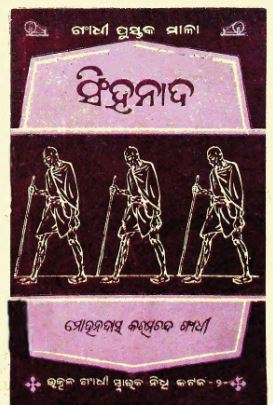Published in 1971, the book Sinhanada is a profound piece of literature in the Odia language that carries the weighty reflections and philosophies of Mohandas Karamchand Gandhi, often revered as the Mahatma. This collection of essays delves deeply into Gandhi’s ideology, particularly focusing on the historic Non-Cooperation Movement—one of the most pivotal campaigns in the Indian struggle for independence.
Sinhanada, which translates to “The Lion’s Roar,” aptly encapsulates the forceful yet peaceful resistance that Gandhi promoted. The book is a rich tapestry of Gandhi’s thoughts on non-violent civil disobedience, offering a comprehensive look at his strategy for emancipating India from British colonial rule.
The essays are strikingly vivid and written with a simplicity that echoes Gandhi’s own lifestyle and philosophies. Each essay in Sinhanada serves as a building block, guiding the reader through the complexities and moral imperatives of the Non-Cooperation Movement.
At the heart of Sinhanada is Gandhi’s unwavering belief in non-violence (ahimsa) and truth (satya). His ideas of Swaraj, or self-rule, were revolutionary—demanding not just political freedom but also economic, social, and cultural independence from the British regime.
The book meticulously outlines the Non-Cooperation Movement, initiated in 1920, to resist British rule in India through non-violent means. Gandhi urged Indians to withdraw their participation from British institutions, including schools, courts, and civil services, and to boycott British goods. The purpose was to paralyze the administrative machinery and create a moral predicament for the British rulers.
Gandhi’s essays on the Non-Cooperation Movement reveal an intricate balance of defiance and discipline. He motivated millions to join the movement, emphasizing that true resistance would come not from violence but from a collective withdrawal of cooperation. The essence of his strategy lay in non-violent non-cooperation, which he believed would showcase moral superiority and ultimately lead to swaraj.
The book provides vivid accounts of mass protests, the boycott of British goods, and the construction of a self-sufficient, self-reliant nation. Gandhi’s call for the promotion of Khadi (hand-spun cloth) and the revival of village industries are highlighted as cornerstones of the economic aspects of the Non-Cooperation Movement.
Sinhanada offers much more than a mere chronological account of events; it presents deep philosophical musings on justice, morality, and the power of peaceful resistance. Gandhi’s reflections on love, unity, and the importance of maintaining communal harmony are woven throughout the book, making it a must-read for anyone seeking to understand the philosophical foundation of India’s freedom movement.
The book ends on an inspiring note, encouraging readers to imbibe Gandhi’s principles in daily life. It serves as a reminder that non-cooperation and non-violence, coupled with a steadfast dedication to truth and justice, can indeed change the course of history.
Sinhanada by Mohandas Karamchand Gandhi remains a timeless work that continues to inspire every reader with its powerful message of peaceful resistance and moral courage. Published decades after the actual events, it resonates with the true spirit of Gandhi’s philosophy, offering valuable insights into the mind of a man whose beliefs and actions have left an indelible mark on the world. The book stands as a poignant tribute to the Non-Cooperation Movement and Gandhi’s enduring legacy in the annals of India’s struggle for independence.
Books Info
| Books name | Sinhanada/ସିଂହନାଦ |
| Author | Mohandas Karamchand Gandhi |
| No Of pages | 105 |
| Publisher | Utkala Gandhi Smaraka Nidhi |
| Publication | 1971 |
| Printed At | Grama Sebaka Press |
| Distributor | NA |

